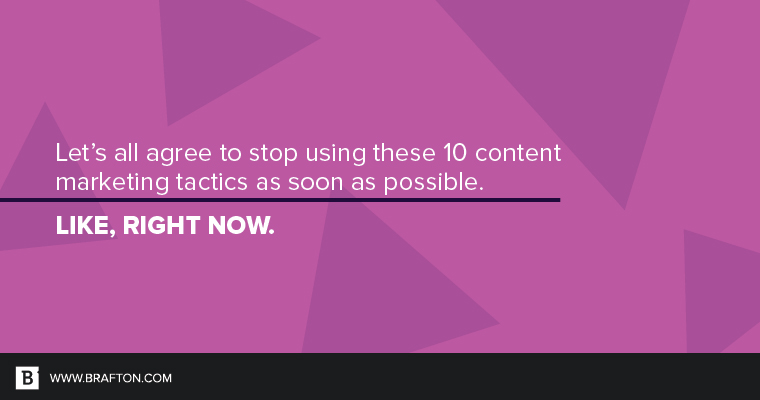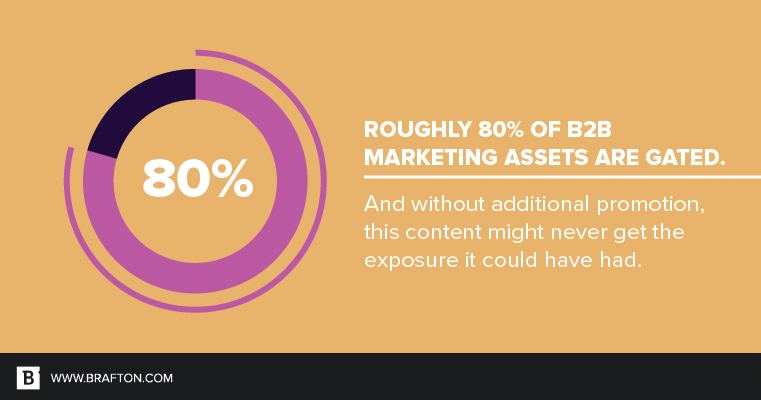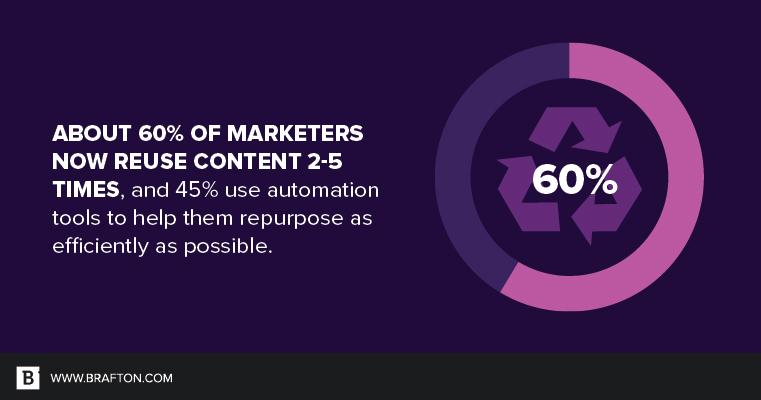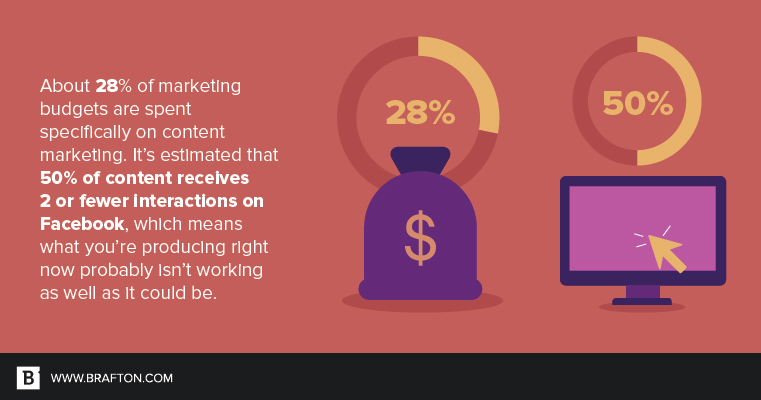We all have our faults. Some of us more than others.
But it’s almost 2018, and content marketing has thrived for more than a decade now. Why are we still making mistakes, heeding bad advice and adding to the trash pile of terrible content?
That’s not a rhetorical question – we need answers, and we need to learn more.
To begin, let’s all agree to stop using these 10 content marketing tactics as soon as possible. Like, right now.
1. Blogging, and only blogging
Yes, companies do this. No, we don’t feel sorry for them.
Common refrains marketers still hear today are:
- My blogs aren’t converting new customers.
- My blogs aren’t generating leads.
- My blogs aren’t reducing bounce rates.
The truth is, blogs are not a lead gen tool and, many times, will actually increase bounce rates, which is totally fine.
In 2018, we hope the “blogging = content marketing” mentality finally breaks; a blog is a necessary component to content marketing, but it’s just one small piece of the puzzle.
The future
Marketers need multifaceted strategies that incorporate virtually every channel and asset type. Remember, content marketing has been around for more than a decade now; some brands are excelling at it, while others still wishfully believe they can get by on the bare minimum.
Include:
- Social
- Video
- Experiential
- PPC
- Custom graphics
2. Misleading/clickbait headlines
This is a bad habit everyone has developed over time. We all want the best listicle, the insatiable Facebook post and the quirky, overly punctuated title – after all, they can produce a lot of clicks and shares from unengaged readers.
But Google (and, more slowly, social platforms) is on a mission to weed out thin, clickbait-ridden content, so the longer marketers stick to the same “amazing headline, but terrible follow-through” format, the sooner they’ll see their organic rankings tank.
Examples:
- “He wrote 6 blogs in one day. You won’t believe what he looks like now.”
- “She lost 47 pounds by eating this weird fruit every day”
- “Man eaten by snake, lives to tell the tale!”
- “When you see what they did next, your jaw will drop”
- “This may look like a joke, but it’s actually horrifying”
- “This may look like a normal house, but wait till you see what’s inside”

The future
RankBrain, along with the ongoing transition to human-first search preferences, should prompt you to drop the keyword stuffing and overhyped titling we’re all used to seeing.
Headlines will remain very important. Very. Case in point: Changing one word in an email subject line has proven to increase click-throughs by 46%.
But the contents of the book must match the cover. If you fail to deliver great content within your post, readers will be left unfulfilled and with a bad taste in their mouths. They will remember you as the brand that over-promised and under-delivered.
So speak naturally, fully articulate your premise in the body copy and don’t over-promise with your titles.
3. Gating content like your life depends on it
Most marketers gate content because they want to generate more leads through form fills. However, that means some of your most precious and time-intensive assets are sitting locked away, and those that enter their contact info are under no obligation to be forthcoming with their real personal information (visitors can submit fake names and email, for instance).
Roughly 80% of B2B marketing assets are gated. And without additional promotion, this content might never get the exposure it could have had.

The future
We’re not suggesting to ungate everything. We’re suggesting you adopt a hybrid gating mode.
Create your expensive assets and gate them as usual; however, repurpose those eBooks and white papers into long-form blog posts, shareable video explainers or web tutorials that are free to the public, no download required. This allows you to simultaneously generate leads in the conventional way but also broaden the scope of your assets to tap into organic reach.
Plus, if a person absolutely wants the downloadable PDF version of an asset, they can easily enter their info to obtain it – it appeases every possible type of readers.
So, ungate (some of) those assets and start from scratch.
4. Pop-ups with UX flaws (which Google hates)
Disruptive advertising on the web has been around as long as the internet itself. However, some marketers are still looking to generate ad revenue through excessive advertisements located (or popping up) on every region of their sites. Even worse, many don’t take the time to master the UX component of their ads.
As of 2017, Google officially penalizes mobile sites that serve pop-up ads after users move from SERPs to a webpage. This sort of penalty will likely become more common as search is now a mobile-first world.
The future
There are several types of pop-ups, including new-window popups, modals, overlays and interstitials. In general, anything that opens a new webpage is not going to work – too many visitors use ad-blockers. Most experts believe that even the least-intrusive ads will soon be booted from SERPs.
That means native advertising will become the new norm.
5. “Set it and forget it” – forgoing reoptimization
Content is not a silver bullet, so get that out of your mind immediately. Although marketers are slowly shifting their resources toward a quality-over-quantity strategy, too many still post content then eagerly await results. If there are none, they give up and create something new, effectively shelving any value their previous efforts may have contained.
The idea that your assets, your site or your strategy as a whole is going to work on the first go-round is incorrect.

The future
About 60% of marketers now reuse content 2-5 times, and 45% use automation tools to help them repurpose as efficiently as possible.
You need a dedicated system for collating older content, assessing potential search opportunities and curating a relaunch of assets – something only 29% of marketers have.
Search behaviors are moving targets, so to continually find success in content marketing, you need to proactively reoptimize content for real-time prospect intent.
6. Bad retargeting
Some of the most common retargeting sins are:
- Cycling through a small sample of ads.
- Deploying too many ads.
- Deploying only a few ads per month.
- Targeting customers who already purchased/converted with the exact same ads.
Many of these problems are still pervasive throughout today’s campaigns, and they can mostly be attributed to marketers not analyzing their retargeting as closely as possible (aka not updating post-conversion pages with code that removes converted users from redundant campaigns, among others).
The future
The optimal number of ad impressions per user per month should be in the 15-20 range, which means about one ad every day or two.
Clickthrough rates also decline 50% after running the same ads for five months, so you must update and refine retargeting ads as much as possible to drive as much value out of impressions as possible.
Lastly, get creative with your ads. Utilize CRO best practices in regard to copy, colors and CTAs.
7. Subject matter expertise above everything else
Subject matter experts within your company are great resources to lean on when launching creative assets. But, they can’t be the be-all, end-all. Moreover, you can’t forgo a talented content producer (designer, writer, videographer) simply because he or she doesn’t immediately have the same SME as your internal resources.
There’s a learning curve. And as you’ve likely experienced before, prodding your in-house experts to actually sit down and produce content at scale is impossible, so save yourself the headache and partner with an agency/producer that complements your marketing efforts.
The future
Creative agencies are built for results – that’s why they exist. That means content creation is actually one tiny gap to fill. You also need the upfront keyword research, competitive analysis, CRO testing, post-launch reoptimization, campaign measurement and reporting that feeds into subsequent content.
You need the whole marketing machine, not just the faint idea of the blueprints.
8. Narrow content that YOU want, not your readers
We often find that companies get stuck in echo chambers: They push a single narrative, shun any references to outsiders and force overly dense, overly promotional content down the throats of readers.
Who are their readers? Typically employees of that company itself or only a small subset of industry folks who likely provide no commercial value to the brand.
Remember, you are not your readers. You are not your buyers.

The future
We’re in a consumer-first world. We all have instant access to information. And now, we only have time for the best of it.
- Close to 95% of consumers find user-generated content helpful when making a purchasing decision.
- Influencer content generates $6.50 for every $1 spent.
Content that comes from trusted influencers or peers is more profitable than churning out the same sales content yourself. So, appease your readers, not your ego.
9. Sticking with the old – out of fear of the new
About 28% of marketing budgets are spent specifically on content marketing. It’s estimated that 50% of content receives 2 or fewer interactions on Facebook, which means what you’re producing right now probably isn’t working as well as it could be.
Marketers generally avoid innovative concepts or off-the-wall techniques that could reinvigorate their content out of fear of the unknown. Will it perform? Will it be a waste? Will you have to change your workflow? Will it require more work?
In 2018, “tried and true” = “boring and irrelevant.”

The future
Marketers are upping their content marketing investments each year and are also diversifying into other assets. Those that don’t can expect results to flatline.
Here’s what’s already on the horizon:
- Interactive campaigns on social (quizzes, giveaways, contests, live video streaming).
- Virtual and augmented reality videos.
- Micro-moment marketing.
- Machine learning platforms.
- Personalized content.
Are you experimenting with any of the above?
10. Using too many CTAs (especially generic ones)
There’s nothing worse than a confusing call to action. Well, perhaps several confusing CTAs at once.
Too often, marketers believe investments in CTAs mean creating more of them rather than refining their existing ones.
Content with irrelevant, misplaced, conflicting or too many calls to action does one thing: it confuses readers. Now why would you want to do that?
The future
Your calls to action need to be hyper-targeted, personalized and unique to the asset/campaign you’re pushing.
- Emails with a single CTA can increase sales by more than 1,600%.
- Personalized CTAs convert 42% more than generic CTAs.
Avoid clutter, misdirection or bland CTAs, and instead run conversion rate optimization experiments to drive maximum value out of each CTA.
In conclusion
Finally. Now there are no more excuses.
We have the problems, we have the solutions and we have our eyes set on the future of content marketing.
This eBook is a starting point – there are plenty of other tactical pitfalls marketers still fall into, and who knows, maybe we’ll have another eBook queued up for those as well.
We have your back.






